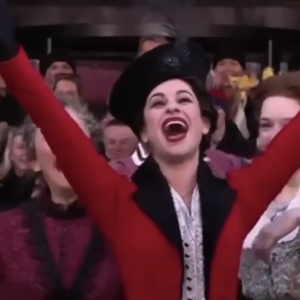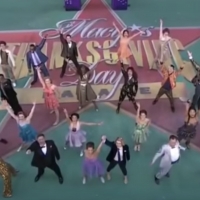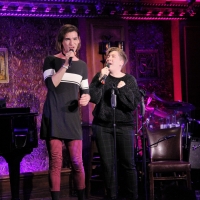Video: The 40 Best Broadway Performances from the Macy's Thanksgiving Day Parade
by Sidney Paterra - Nov 27, 2024
The Macy's Thanksgiving Day Parade, one of the nation's most cherished holiday traditions is also responsible for helping to bring some of our favorite Broadway shows and performances to the small screen. Our team has rounded up 35 of the very best performances from Broadway in year's past.
BWW Feature: Cabaret Today
by Stephen Mosher - Oct 15, 2020
What is it about the art form of cabaret these days that is different from the art form of cabaret from yesterday? Sometimes nothing; but sometimes every damn thing.
BWW Blog: Broadway's Top 5 Dad-Ballads
by Student Blogger: Izzi Diaz - Jun 1, 2020
With Father's Day approaching, June is the month to recognize the dads of Broadway. More specifically, highlight their songs that tug at our heartstrings and might cause for an occasional silent wipe of a tear or extra call to dad after the show.
Box Office for Broadway's WOLF HALL Now Open at Winter Garden Theatre
by Tyler Peterson - Feb 16, 2015
The box office of the Winter Garden Theatre (1634 Broadway, between 50th and 51st Streets), home of the anticipated Broadway transfer of the Royal Shakespeare Company's critically acclaimed theatrical event Wolf Hall: Parts 1 & 2 is now open for business.
STAGE TUBE: Farewell Speech at Hugh Panaro's Last PHANTOM OF THE OPERA
by Courtnie Mele - May 4, 2014
Hugh Panaro is ending his run as the Phantom in Broadway's THE PHANTOM OF THE OPERA. Before playing the phantom, Panaro played the role of Raoul, which he played for 900 performances. As the the Phantom, Panaro played 2227 performances. His fellow cast members did the math and found that he has appeared in THE PHANTOM OF THE OPERA for over 3000 performances.
THE FIREBRAND OF FLORENCE Begins 3/12
by BWW News Desk - Mar 12, 2009
On March 12, 2009 at 7:00 p.m., The Collegiate Chorale appears with The New York City Opera Orchestra at the newly renovated Alice Tully Hall in a performance of Kurt Weill and Ira Gershwin's 1945 Broadway operetta The Firebrand of Florence. The performance, led by guest conductor Ted Sperling, stars baritone Nathan Gunn, soprano Anna Christy, baritone Terrence Mann, and soprano Victoria Clark. Krysty Swann, David Pittu and Patrick Goss complete the cast, and narration will be provided by Stage Director Roger Rees.
Boasting a score by Kurt Weill, lyrics by Ira Gershwin, and a book by playwright and screenwriter Edwin Justus Mayer, The Firebrand of Florence had a short run on Broadway in 1945. The work was subsequently not heard for over a half-century until three presentations - Ohio Light Opera (1999), the BBC Symphony Orchestra in London (2000) and the Radio Symphony Orchestra in Vienna (2000) - shed new light on the relatively obscure work. The performances were not only accepted, but widely acclaimed, thus giving hope for a new life in a new century. Variety's theater critic Steven Suskin says 'I have long believed that Firebrand in concert should be a dazzling delight.'
Benvenuto Cellini, the great Florentine artist, is sentenced to hang, but he is pardoned when the duke realizes that he has not completed a previously commissioned sculpture. Freed, he is able to turn his attention to his favorite model (and object of his affections), Angela. The Duke also is interested in Angela. In a typical operetta plot, Cellini swashbuckles around the stage, keeping the Duke away from Angela, keeping himself away from the Duchess, and escaping yet another death sentence by fleeing to Paris, as the end of the show recapitulates the beginning.
THE FIREBRAND OF FLORENCE Begins 3/12
by Gabrielle Sierra - Jan 26, 2009
On March 12, 2009 at 7:00 p.m., The Collegiate Chorale appears with The New York City Opera Orchestra at the newly renovated Alice Tully Hall in a performance of Kurt Weill and Ira Gershwin's 1945 Broadway operetta The Firebrand of Florence. The performance, led by guest conductor Ted Sperling, stars baritone Nathan Gunn, soprano Anna Christy, baritone Terrence Mann, and soprano Victoria Clark. Krysty Swann, David Pittu and Patrick Goss complete the cast, and narration will be provided by Stage Director Roger Rees.
Boasting a score by Kurt Weill, lyrics by Ira Gershwin, and a book by playwright and screenwriter Edwin Justus Mayer, The Firebrand of Florence had a short run on Broadway in 1945. The work was subsequently not heard for over a half-century until three presentations - Ohio Light Opera (1999), the BBC Symphony Orchestra in London (2000) and the Radio Symphony Orchestra in Vienna (2000) - shed new light on the relatively obscure work. The performances were not only accepted, but widely acclaimed, thus giving hope for a new life in a new century. Variety's theater critic Steven Suskin says 'I have long believed that Firebrand in concert should be a dazzling delight.'
Benvenuto Cellini, the great Florentine artist, is sentenced to hang, but he is pardoned when the duke realizes that he has not completed a previously commissioned sculpture. Freed, he is able to turn his attention to his favorite model (and object of his affections), Angela. The Duke also is interested in Angela. In a typical operetta plot, Cellini swashbuckles around the stage, keeping the Duke away from Angela, keeping himself away from the Duchess, and escaping yet another death sentence by fleeing to Paris, as the end of the show recapitulates the beginning.






